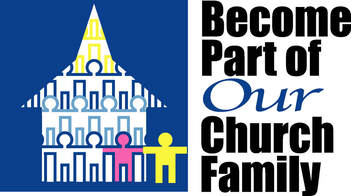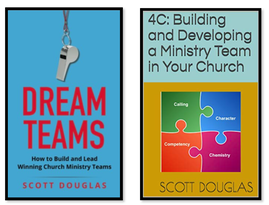 There's a great article from Chuck Lawless that dropped today about what he's learned about Church Membership Classes. If you've never thought about incorporating those into your church's assimilation strategy, I'd encourage you to read the article and give it some consideration! One of my favorite pictures of the church is that of a family, and families live in a home. When we see new faces come into the church, they become part of the family. Since they're part of the family, they have a place in the home. Sadly, as many come in our front door, anecdotal evidence suggests that just as many (if not more) are going out the back door. Why? I'd argue it's because for many of us as pastors, we don't place a high enough priority on what it means to be a church member. Think about your house for a bit, and imagine that new people are going to be coming into the house. And not just into the house, but part of the family. Where do they put their stuff? New people moving into your house need a place to put their luggage, hang their clothes, and sleep at night. When people want to join our churches, we can't just say "Glad you're here!" and leave them to figure out where they go. Every time we do a new member meeting, we encourage them to find a group to plug into. Our new members need a group. They need a place to put their stuff and belong. Whether it's a Sunday school class or a Bible study or a small group, groups matter. What are their chores? Every family has a way of dividing up the household responsibilities. Some of it is dependent on the age of the kids, or the ability of those living in the house. But as we tell our kids, part of being in the family is helping out with chores (meaning you don't get ice cream or money for unloading the dishwasher). Membership in the family of God means finding a way to serve. Membership is active. And every new member brings with them a SHAPE (Spiritual Gifts, Heart, Abilities, Personality, and Experience) that is a way of leveraging their lives for the Gospel and the good of God's people. What are their expectations? Every family has expectations of those who are part of the family. It might be a curfew for teenagers, or pitching in on family bills (which explains why Danny Tanner kept his house full). When we see people join our churches, part of that involves expectations. Those aren't one sided. When someone joins our church, we as church leadership and pastors have an expectation and responsibility to shepherd, care, love, and spiritually nourish & guide them. Likewise, the expectations we have for church members are prayer, financial support, serving, and loving. Church membership classes are a great resource. If your church can do them, you should. Not every church can realistically pull them off. But they can do something. One way to do that is to take the concept of a membership class and scale it to coffee. Our church has an intentional plan of myself and/or other pastoral leadership meeting with prospective members. We do all the things that you would expect in a new member class. We talk about the church's history, vision, direction, and doctrine. We get to know each other. We hear each other's salvation stories. We answer any questions (most of ours are about the differences between us and other denominations). We follow up and ask for a response as God leads. The only difference is we do that on a smaller scale with coffee or lunch involved. Here's the biggest takeaway, especially for us as pastors. There's not a magic bullet for coming up with the perfect membership assimilation process. The key is to do something. Doing something is always better than doing nothing. And if your something is intentional, reflective, and seems to be working to assimilate people into your church, awesome. Praise God. So in the comments, what does your church do to help people who are moving into your house?
4 Comments
 Several years ago I had the fortune and blessing to have my first book be published by a small book publisher. It was an idea I'd kicked around for quite some time as I went through doctoral studies in pastoral leadership about the importance of a team-based approach to ministry. I loved interacting with ministry leaders and authors who helped me understand how much healthier and better a church staff could be. With a trusty cliche from high school of "There's no I in TEAM" I put together a paradigm of understanding team-based ministry through four aspects: Calling, Character, Competency, and Chemistry. As a good Baptist, they had to alliterate! Each of those is valuable on its own, but together they build a team approach to ministry. As with any first version, you always find things to improve upon. For me it was through a conversation with a ministry colleague who liked the principles but felt it was written too much for non-typical churches. And he was right. I'd written it with people in my place in mind, those serving in a full time multi-staff church context. But that's not the "typical" church. Also I'd written Dream Teams as a second chair leader, and moving into a lead pastor role caused me to see things differently. So when the publisher offered to return the copyright for Dream Teams, I took it as a chance to make the improvements I'd wanted for a while. And that's where we are now, with the remix dropping. Instead of Dream Teams, it's being released under the banner of 4C. The Cs are the emphasis, and I wanted that put on display from the beginning with the title and cover. Grab a copy on Amazon. Like, comment, share, and leave a review if you found it helpful at all.  At first glance this book looks like it's written for the person in a worship service who sings, encourages others to participate, and can play the rhythm on guitar (or piano or without instruments). If you know me at all, you know there is nothing in that list I can do. And that's the problem that Boswell and the contributors are addressing. At the core of this compilation of pastoral essays on worship is a fundamental belief that the way a church worships is inseparable from its theological foundation and conviction. It's why I believe that the pastoral leadership of the church should be invested and involved in the planning and execution of corporate worship. It's not a separation where the music guys handle this part and the preaching guys handle that part. That's why I, as a lead pastor, was so grateful for this work. It shows that our fundamental understanding of worship leadership is more than being able to regurgitate CCM Top 40 stuff or that you can dink out a few hymns on a keyboard. It's a responsibility that involves the faith formation of the local church, and pragmatically shows when we realize that in many of our churches our worship leadership is more visible than the preaching leadership. So when we as lead pastors work with the worship leadership in our churches, we have to see ourselves as both partners and complements to one another. Worship leaders, I would commend this book to all of you. Beyond the practicality of gathering for worship and working through a service and its importance, this has a lot to say about your heart, your own personal devotion, your family, and your relationship with your lead pastor. Anytime I see staff/team dynamics pop up in a book, I'm hooked. I believe that chemistry and team dynamics are a missing ingredient in far too many of our churches, which is why Boswell's work and others are so crucial for us to read and consider because they show that team-based ministry is both fruitful and healthy (and biblical). If I were to draw out five practical takeaways from this, and share them with worship leaders, here's what they'd be: 1. Reevaluate your responsibility in light of the Gospel calling on your life - Don't see yourself as a performer or a "lead worshipper," see yourself as a pastor shepherding God's people towards the Throne. Off stage, that also means seeing that God has called you to a local church as a pastor/shepherd, not a hired hand. Embrace pastoral care, nursing home visits, administration, and serving across the board. 2. Develop a relationship with your pastor - The person you'll work closest with is the lead/senior pastor in your church. Cultivate a relationship with him, work on a friendship, get to know him, go out for lunch, accompany him on visits to the hospital, and regularly pray with/for him. Because the two of you are the most visible people in a worship service, friction is going to be obvious. 3. Build worship services around Revelation and Response - Revelation is where God speaks to us through His Word, and Response is where we, in light of that, respond to what He has done. That can be praise, adoration, confession, repentance, lament, commitment, and trust. We do a disservice to both the witness of Scripture and the reality of human experience when everything about our worship service is designed to produce shiny happy people (thank you REM) who just walk around saying "Saved glad and happy!" all the time. 4. Raise up others - Developing others in ministry is more than getting people to fill spots, but intentionally investing in them for future deployment. That means we don't just pick people who can play the right instruments on the right notes, but we identify people who have potential for leadership on their own. Think about it in your own life along those lines. At some point you were brought along to grow as a leader. Who is in your ministry now who you could elevate and disciple? 5. Pursue humility - Humility is hard for all of us. No one is exempt from the trapping and allure of notoriety. As awesome as a platform and Twitter followers might be, nothing can surpass "Well done good and faithful servant." Humility is the guard against us falling too much in love with ourselves. Ground yourself daily in the Word. Develop accountability. Invite people into your life. Be gracious with correction and constructive feedback. Our music/kids minister had to, for a class I'm teaching, write a letter to his younger self about ministry lessons he'd learned. I thought I'd give it a whirl too. So this is going to 19 year old Scottie somewhere around 2002. Wassup! (Don't worry, in the future you'll only use that to reminisce about the past)
Hello 2002 Scottie! This is you from 2020. I know you're going through some stuff now. But what's happened will be part of how God is going to use you and shape you into who He wants you to be. I hoped this letter got to you while you're opening up those commentaries that Davis gave to you. You're wondering what's going on and why you've been asked to lead a few weeks of a small group study. Trust me, you're in for a ride. This is what God's going to use to call you into ministry. I'll start with the personal stuff. Hang tight til 2006, you're gonna meet someone special. We've got two awesome kids and we're about to hit 12 years married. Oh, and I'm writing this with a little sunburn from being at the beach this week. You're going to end up living in Florida. It's pretty awesome. You'll also be in school way longer than you ever imagined, but you'll have a Seinfeld episode for a dissertation and you'll have alphabet soup after your name. Your church is going to be a blessing to you and your family. Here's something else crazy you won't believe: Louisville is going to have a Heisman winner. And you might want to start saving up for the 2013 Final Four. Trust me. It'll be worth it. Just don't watch the Duke game in the Elite 8. Oh, and while I'm at it, on your next shift at Starbucks, sign up for all the stock options you've got available. Trust me on that one. You're sitting there wondering what's going on inside your heart and why you're feeling a pull towards some form of ministry. Spurgeon called it "an all consuming desire for the work." You'll get there. It'll take a couple years and some refining but it'll be a really neat a-ha! moment. So if I can pass on something to 19 year old me who might not be humble enough to listen... First, be no one's but Christ's - Don't fall into trappings of tribes or camps. Your allegiance, your identity, your purpose, your everything, is wrapped up in Jesus. You are His. Do not compromise this. You'll run into some instances down the road where your desire to be liked and taken seriously (I know it's there) will put you in some places to compromise. Don't. Trust me. It's not worth it. Not everything is a hill worth dying on, but some things are. When you do speak up on those things, don't expect to be cheered. Some will appreciate it, others won't. Second, buckle up - It sounds exciting now, but ministry isn't for the weak or for the timid. You'll lose track of the number of times your heart will break, how many times you'll be misquoted, how mean people in the church can be, the ugly way you'll be treated by people who you'd been close to, and how nasty spiritual warfare can be. That book you've put off reading on spiritual disciplines... you might want to dig into it. It'll be all that keeps you from going crazy, and from wanting to walk away from ministry in 2015 (Sorry man, that season is going to be bad. Wish I could change it, but you'll be sold out by someone you looked to as a mentor). Third, find joy - I know the second one is hard. But this is a lesson I've learned in 10+ years of ministry. If you don't find joy in what God is doing around you, you'll become bitter and resentful. You might not see it now, but there will be times where your soul will be so full you'll feel it. Look for those little things in everything you do. Find the sparks of where God is working. They'll be there. You'll get emails and text messages (true story, you'll use your phone more for that than calling) from students in your youth ministry sharing the impact you had. Fourth, be gracious - I know it's coming. You're going to hit your cage-stage Calvinism soon. Your humility hasn't caught up to your opportunity, and quite frankly it won't until you're about 30. Wish there was better news but you're slow to learn. Seriously though, don't be a jerk. Be gracious. It's not going to be worth losing friendships because you want to be right. I've watched that, not just in our life, but in others, who wanted to be right so much they were willing to bomb bridges, not just burn them. Don't be that guy. Fifth, be an eager learner - It'll be 15 years before you're a lead pastor. You'll be spending time in what you'll learn are called "second chair" roles, and some third and fourth chairs! Wherever you are, be an eager learner. God will place people in your life who will be excellent teachers. Look to them. Learn from them. A few will teach you things not to do, and that'll pay off more than you can know. You'll be frustrated sometimes because those you're learning from won't move or do like you think they should. Be humble enough to be patient. Take notes. Learn and retain everything you can. Sixth, love the Word - There won't be a book you read (or write for that matter - yes, you'll publish books! Don't get too excited, the sales are lousy) that will be as important as the Bible. Make it a commitment now to read it, study it, and store it away. Your "success" as a pastor isn't going to come by being smart or by being creative, it will come by being faithful to the calling. Next time you're on campus to visit with Davis, ask him to show you the front of Norton Hall. That'll stick with you. There's so many more I wish I had time to write. Unfortunately the best lessons in ministry are the ones you have to learn the hard way. God is good though. And He is faithful. And He'll finish what He's starting in you now. From the future! 2020 Scottie |
Scott M. DouglasA blog about leadership and the lasting legacy of family ministry. Archives
August 2023
Categories
All
|
 RSS Feed
RSS Feed



